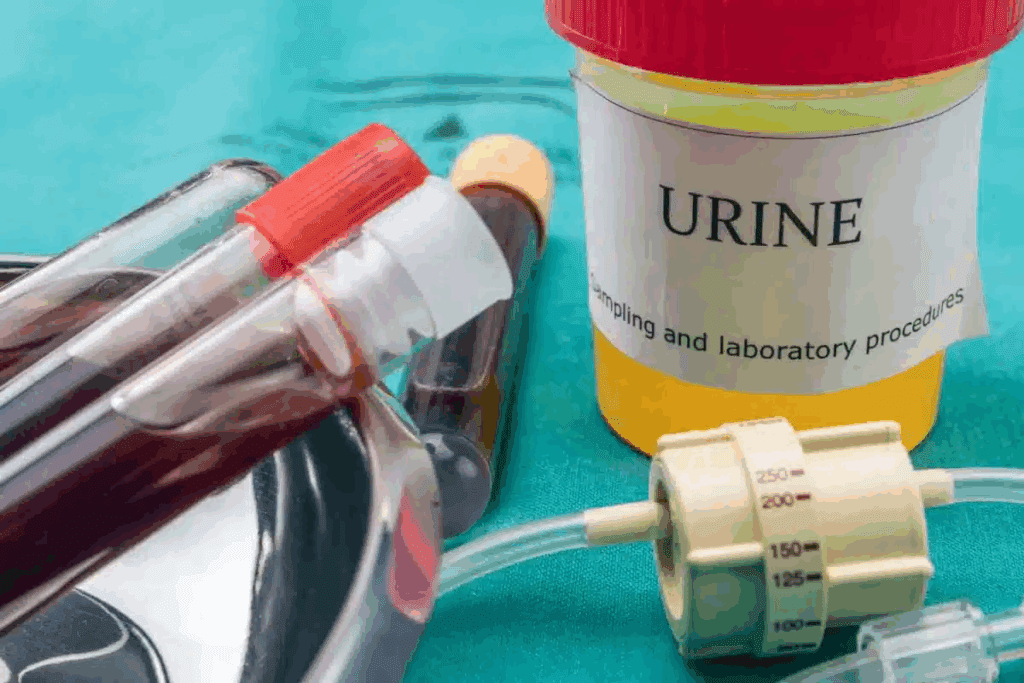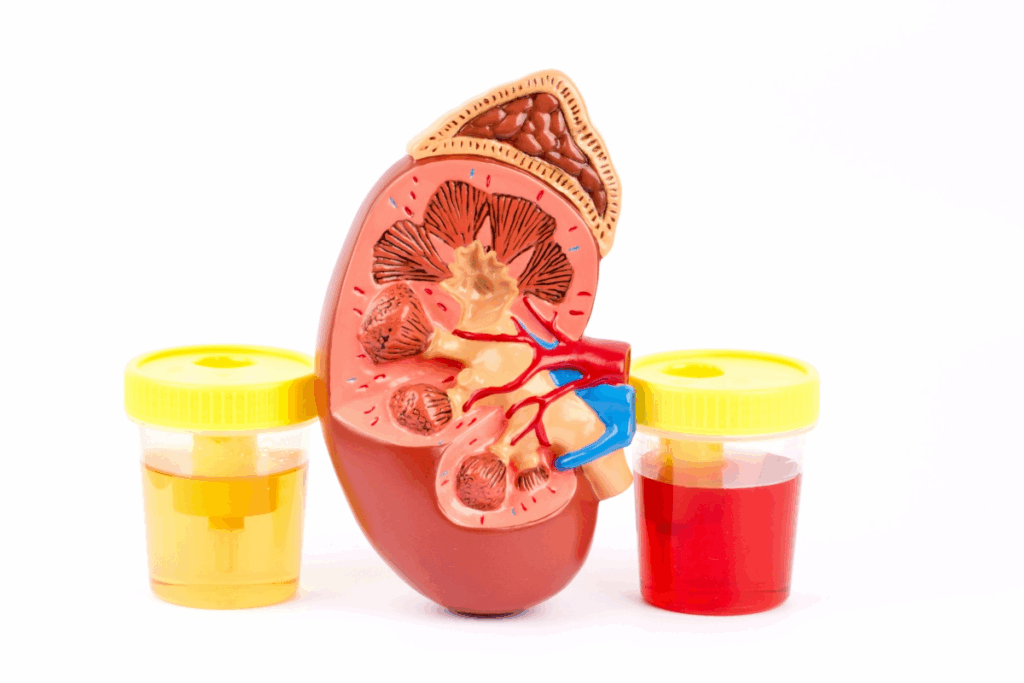Last Updated on November 25, 2025 by Ugurkan Demir

Finding blood clots in urine without pain can be scary. It’s a sign that needs quick medical help. This issue, known as hematuria with visible clots, can show many problems, from simple to serious.
At Liv Hospital, we know passing blood clots means there’s a problem in the urinary tract. It could be infections, kidney stones, or even cancer. Most causes can be treated with the right care, but ignoring it can let problems get worse blood clots in urine male no pain.
We aim to give our patients the best care and support. It’s important to understand hematuria and get medical help. This helps find and treat the cause right away.

Blood clots in urine can be scary and make you worry about your health. Seeing clumps or blood in your urine is alarming. It’s important to know what it might mean.
Hematuria, or blood in the urine, is more common than you think. It affects up to 30% of adults at some point. Blood in urine can change its color to pink, red, or brown.
Hematuria means there’s blood in your urine. It’s divided into microscopic and macroscopic hematuria. Knowing the difference helps find the cause and what to do next.
Microscopic hematuria means blood is too small to see without a microscope. Macroscopic hematuria is when blood is visible, changing urine color. Both can signal different health issues, from infections to serious diseases.
Blood clots in urine, with or without pain, need attention. They suggest bleeding in the urinary tract. The size and look of these clots can hint at their cause.
While some hematuria might be harmless, others can signal serious health problems. It’s key to get medical help to find out why you have blood clots in your urine.

Blood clots in urine are a big health issue for many men, often without pain. This is called hematuria. It can happen for many reasons, some more common in men.
Blood clots in urine are common in men, more so as they get older. Conditions like an enlarged prostate can cause it. It’s important to know that while an enlarged prostate can make urinating hard, it can also cause bleeding without pain.
Doctors say that blood in the urine, even without pain, is a serious sign. It could mean there’s a big problem.
“Hematuria can be a symptom of various urological disorders, ranging from infections to malignancies.”
Pain isn’t always there with hematuria. Sometimes, the bleeding is small and doesn’t hurt. Other times, the problem doesn’t bother the lining of the urinary tract enough to cause pain.
Even without pain, it’s very important to see a doctor. Men with painless hematuria need a full check-up to find out why.
While blood clots in urine without pain might be okay, some signs mean you need to see a doctor right away. These include:
Knowing these signs is key to catching serious problems early. If you or someone you know has these symptoms, get medical help fast.
Urinary tract infections (UTIs) are a big reason for blood clots in urine in men. They often happen without pain. UTIs are bacterial infections that can hit any part of the urinary system, like the urethra, bladder, and kidneys. While more common in women, men can get them too, mainly with age or health issues.
It’s key to know how UTIs cause blood clots in urine. We’ll look at how UTIs affect men, why there’s bleeding without pain, and what makes UTI clots different.
In men, UTIs can cause symptoms from mild to severe. The infection can cause inflammation and irritation in the urinary tract, leading to bleeding. Sometimes, this bleeding can make blood clots visible in the urine.
UTIs in men often link to conditions like an enlarged prostate, kidney stones, or urinary tract problems. These can block urine flow, raising the risk of infection.
Bleeding without pain is a worrying sign with UTIs. The lack of pain doesn’t mean the infection is mild. It might just mean the infection isn’t irritating the pain receptors in the urinary tract.
In some cases, the infection might be in parts of the urinary tract where pain is less likely, like the upper urinary tract or kidneys.
UTI-related blood clots have unique signs that help diagnose the cause. These clots might come with symptoms like fever, urgency, frequency, or burning when you pee.
| Characteristics | Description |
| Clot Appearance | UTI-related clots may appear as small, stringy, or irregularly shaped clots. |
| Associated Symptoms | Fever, dysuria (painful urination), frequency, and urgency. |
| Urine Appearance | Urine may be cloudy, dark, or have a strong odor. |
Spotting these signs is vital for doctors to diagnose and treat UTIs well. This helps avoid serious problems like kidney damage or sepsis.
Kidney stones can irritate and damage the urinary tract. This can lead to bleeding and blood clots. We will look into how kidney stones cause these issues and what makes stone-related blood clots different.
Kidney stones are hard mineral deposits in the urinary tract. When they move or get stuck, they can hurt the tract’s lining. This causes bleeding.
The stone can also cause inflammation and abrasion. This leads to blood in the urine.
In some cases, kidney stones can cause bleeding without pain. This happens when the stone is small and can pass through the tract without blockage or severe irritation. But, even without pain, blood clots in the urine need medical attention.
Stone-related blood clots can look different. They might be small or form large clots seen in the urine. The look of these clots can hint at their cause.
| Characteristics | Description |
| Size | Can range from small fragments to large clots |
| Appearance | May appear as red or brown clots in the urine |
| Associated Symptoms | May be accompanied by pain, nausea, or vomiting, but can also occur without pain |
Knowing about stone-related blood clots is key for diagnosis and treatment. If you see symptoms of kidney stones or blood clots in your urine, get medical help.
An enlarged prostate, or benign prostatic hyperplasia (BPH), is common in older men. It can cause hematuria, which is blood in the urine. This is alarming and needs a doctor’s check-up.
BPH is a non-cancerous growth of the prostate gland. It affects many men as they age. The prostate surrounds the urethra, which carries urine from the bladder.
As the prostate grows, it can press on the urethra. This can cause urinary problems.
The cause of BPH is not fully known. Hormonal changes with age are thought to play a role. These changes can cause the prostate to grow.
Bleeding in an enlarged prostate comes from fragile blood vessels. As the prostate grows, these vessels can break easily. This leads to bleeding into the urinary tract.
Key factors that contribute to bleeding in BPH include:
Men with BPH may have weak urine flow and need to urinate often. They may also wake up to urinate at night. Hematuria in BPH often means there are blood clots in the urine.
Blood clots in the urine can be scary. But BPH is usually not serious. Yet, any blood in the urine needs a doctor’s check to make sure there’s no other issue.
Kidney infections, or pyelonephritis, are serious and can cause blood clots in urine. They can lead to a lot of health problems if not treated quickly. We will look at how kidney infections and blood clots are connected, why they might not hurt, and how to tell them apart.
Pyelonephritis is more common in women, but men can get it too. This is more likely if there’s a blockage in the urinary tract or after surgery. Men’s symptoms can be different, making it harder to diagnose.
Key factors that increase the risk of pyelonephritis in men include:
Kidney infections can sometimes not show symptoms or have mild symptoms, including pain. Not having pain doesn’t mean the infection is not serious. Several things can make a kidney infection painless, like where the infection is and how people feel pain differently.
The reasons for painless kidney infections can include:
Blood clots from kidney infections have unique features. Knowing these can help figure out why someone has blood in their urine.
| Characteristics | Description |
| Clot Size and Shape | Variable, can be large and irregular |
| Color | Typically dark red or brown |
| Associated Symptoms | May include fever, flank pain, or urinary urgency |
It’s important to know the signs of blood clots from kidney infections. If you have symptoms like blood in urine, fever, or pain in your side, see a doctor right away.
Bleeding from the urethra or prostate can cause blood clots in urine. This is a serious issue that needs medical help. We will look into what causes this bleeding and its effects.
Urethral bleeding can happen for many reasons. Trauma or injury to the urethra is one cause. Vigorous sex can also lead to bleeding in urine and semen in males. Infections and inflammatory conditions can also cause bleeding.
“Trauma to the urethra can cause significant bleeding, leading to visible blood clots in the urine.”
The prostate gland often causes bleeding in men. This is more common in those with an enlarged prostate or prostatitis. The bleeding can happen at different times.
The look of blood clots can tell us where they come from. Clots from the prostate might look different than those from the urethra. Knowing this helps doctors figure out what’s wrong.
Doctors can guess the cause by looking at the blood clots and symptoms. Then, they can plan the right treatment.
Painless hematuria can signal serious health issues. Blood in the urine without pain is a red flag. It means you need to see a doctor right away.
Bladder cancer often shows up as blood in the urine. This is the first sign many people notice. It’s important to catch it early to treat it well.
Kidney cancer can also show up as blood in the urine. It might grow a lot before you notice symptoms. That’s why regular check-ups are key.
Prostate cancer can also cause blood in the urine. But it’s less likely to be painless compared to bladder or kidney cancer.
Advanced prostate cancer can spread and cause bleeding. Tests like PSA and digital rectal exams help find it early.
| Cancer Type | Common Symptoms | Risk Factors |
| Bladder Cancer | Hematuria, frequent urination | Smoking, chemical exposure |
| Kidney Cancer | Hematuria, flank pain | Smoking, obesity, hypertension |
| Prostate Cancer | Urinary symptoms, hematuria | Age, family history, ethnicity |
Tumors can grow without causing pain until they block or invade nearby areas. Regular screenings help find cancer early.
In conclusion, blood in the urine without pain is a warning sign for many cancers. Knowing the risks and the importance of early detection can help save lives.
It’s vital to know the danger signs of blood clots in urine. This knowledge helps in getting timely medical help. Being aware of symptoms that need quick attention can prevent serious health issues.
Certain symptoms with blood clots in urine need urgent medical care. These include:
Large clots can block urine flow, leading to serious issues. If you face any of these, get medical help right away:
Severe blood loss from hematuria can be life-threatening. Watch for these signs of significant blood loss:
If you or someone you know shows these symptoms, get emergency medical care right away.
| Symptom | Description | Action Required |
| Large Clots | Clots that are significant in size or numerous | Seek emergency care if they obstruct urinary flow |
| Severe Pain | Acute abdominal or back pain | Immediate medical attention is necessary |
| Signs of Infection | Fever, chills, or other infection signs | Urgent medical care is required |
Blood clots in urine need a detailed check to find out why they happen. We know it’s tough to go through tests, but they’re key to finding the cause of blood in your urine.
The first step is a detailed medical history and physical check-up. Then, we do initial tests like urinalysis to look for blood, protein, and infection signs. These tests are vital for spotting problems like kidney issues or infections.
Key initial tests include:
Imaging tests are essential for finding the cause of blood clots in urine. We often use ultrasound and CT scans to see the urinary tract. These scans help spot problems like kidney stones, tumors, or structural issues.
At times, we need special tests to figure out why you have blood in your urine. Cystoscopy is one such test. It uses a flexible tube with a camera to look inside the bladder and urethra.
Cystoscopy allows us to:
We’ll walk you through each step of the diagnostic process. We want to make sure you’re comfortable and understand what’s happening. Even though it might take some time, it’s important for finding the cause and treating it.
Preparation is key: Make sure to follow any pre-test instructions and ask questions if you’re unsure about anything.
Treatment for blood clots in urine varies based on the cause. Causes can include infections, kidney stones, prostate issues, and cancer. Knowing the cause helps doctors choose the right treatment.
For blood clots caused by infections, doctors often start with antibiotics. The type of antibiotic used depends on the infection. Sometimes, patients need to stay in the hospital for IV antibiotics if the infection is serious.
Kidney stones causing bleeding are treated to manage pain and help the stone pass. Drinking lots of water is important. Doctors may also give pain medicine to help.
Prostate issues like BPH can cause blood clots in urine. Treatment may include medicines to shrink the prostate or relieve symptoms. Sometimes, surgical procedures are needed.
Cancer-related blood clots in urine need specific treatments. These can include surgery, chemotherapy, radiation therapy, or a mix of these. Finding cancer early is key to better treatment outcomes.
| Cancer Type | Common Treatments |
| Bladder Cancer | Surgery, Chemotherapy, Radiation |
| Kidney Cancer | Surgery, Targeted Therapy |
| Prostate Cancer | Surgery, Radiation, Hormone Therapy |
We’ve looked at why blood clots in urine happen, like infections, stones, and cancer. Knowing these reasons is key to living with hematuria and stopping it before it starts. By understanding the risks and taking steps to avoid them, you can lower your chance of getting hematuria and its problems.
Blood clots in urine might mean you have a kidney disease you don’t know about. So, if you keep getting blood in your urine, see a doctor right away. Eating well and drinking enough water can also help preventing urinary blood clots.
Going to your doctor regularly is also important. This way, you can catch any problems early. With your doctor’s help, you can make a plan to stop blood clots in urine. We aim to give top-notch healthcare and support to patients from around the world. If you’re worried about your urine health, please talk to a doctor.
Blood clots in urine without pain can come from many sources. These include urinary tract infections, kidney stones, and an enlarged prostate. Kidney infections and cancers like bladder, kidney, or prostate cancer are also causes.
Urinary tract infections can irritate the urinary tract’s lining, causing bleeding. If not treated, UTIs can lead to serious problems.
Kidney stones can irritate the urinary tract, causing bleeding. The type of blood clot can help doctors diagnose the issue.
Yes, an enlarged prostate can irritate blood vessels in the prostate gland. This irritation can lead to bleeding.
Kidney infections can cause inflammation in the kidney. This inflammation can lead to bleeding, even without pain.
Signs of severe blood loss include dizziness, fainting, and a rapid heartbeat. If you notice these, get emergency help right away.
Seek emergency care for large clots, severe blood loss signs, or if you have a history of kidney stones. These are urgent situations.
Doctors use initial tests, imaging studies, and procedures like cystoscopy to find the cause. These help determine the underlying issue.
Infection-related blood clots are treated with antibiotics. Supportive care helps manage symptoms.
For stone-related bleeding, treatment focuses on removing the stone or managing symptoms. This addresses the root cause.
Yes, cancers like bladder, kidney, or prostate cancer can cause painless bleeding. It’s vital to get a medical check-up to find the cause.
To prevent urinary blood clots, understand the causes and take steps. Stay hydrated, manage conditions, and seek help if symptoms persist.
Government Health Resource. (2025). Why Am I Passing Blood Clots in Urine. Retrieved from https://www.niddk.nih.gov/health-information/urologic-diseases/hematuria-blood-urine
Subscribe to our e-newsletter to stay informed about the latest innovations in the world of health and exclusive offers!